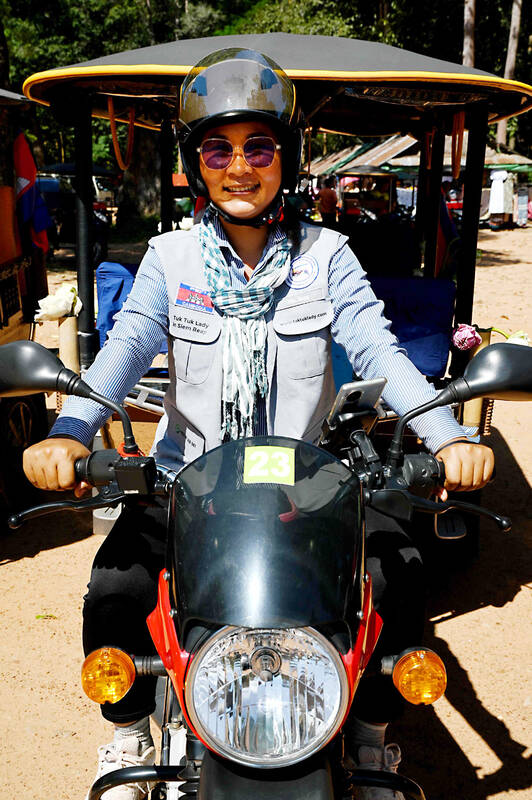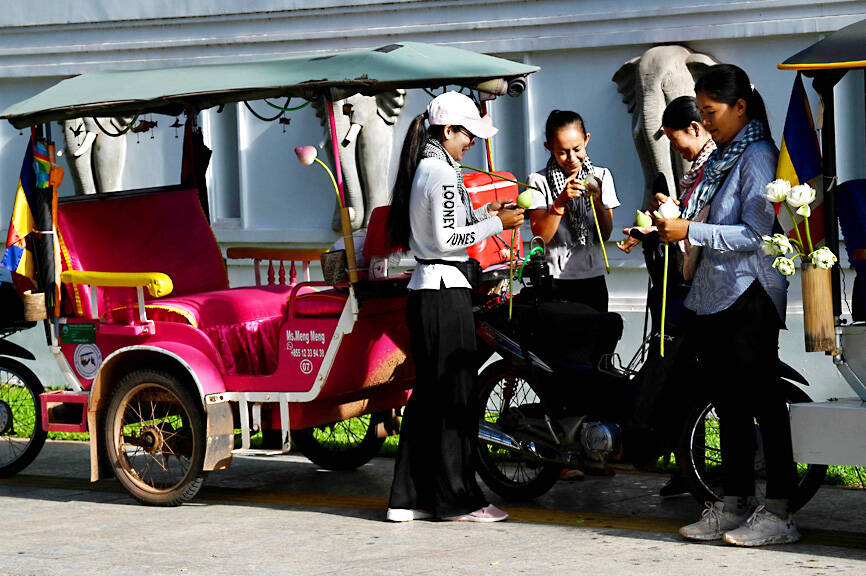Every day Roeung Sorphy deftly weaves through the streets of Siem Reap, zigzagging past cars, motorbikes and the occasional stray dog as she shepherds tourists to the famed Angkor Wat temple complex.
However, on the road to becoming one of Cambodia’s tiny number of female tuk-tuk drivers, the 37-year-old who goes by the nickname Sopy has to dodge not only other road users, but also a barrage of taunts, misogyny and prejudice.
Cambodia has taken legal and practical steps toward gender equality, but it remains a conservative, patriarchal society. Women are expected to run the home and family rather than seek paid work.

Photo: AFP
When Sopy first took to the streets, it was tough.
“At first, they [male drivers] looked down on me... They said we women should stay at home and clean dishes,” she said, describing how she was verbally harassed and assaulted when competing for fares.
“But we keep persevering,” she said after she finished cleaning her tuk-tuk, decorating it with blooming white lotus flowers.

Photo: AFP
She got her start after borrowing money to buy her tuk-tuk, and has now been driving through the shaded roads of Angkor Park for more than three years.
“We cannot just rely on husbands,” she said, urging more women to join the profession.
“We will be strong like men,” said Sopy, whose husband is also a tuk-tuk driver.
After years, her male colleagues have finally accepted her.
“They think we are the same,” Sopy said. “I love the job. I think all women can do it.”
A 2020 US Agency for International Development report said women were being held back by low wages, poor working conditions, a lack of childcare and limited access to finance and training.
To help women in the male-dominated field, well-known driver Kim Sokleang — better known as Tuk-Tuk Lady — last year founded the Siem Reap Remorque Driver Association.
Her group includes 20 female drivers, six of whom, like her, are single mothers.
“Discrimination against Cambodian women still exists,” Kim said while waiting for passengers at the Bayon temple.
After getting a divorce in 2013, Kim began driving a rickshaw in the capital Phnom Penh to feed her two sons.
“On the first day, I did not have any passengers,” Kim said, recalling how one woman refused to ride with her.
Finding Phnom Penh tough, the 39-year-old moved to Siem Reap in 2015 to drive tourists.
Initially it was rough, Kim said, describing how she would sob in her tuk-tuk when she failed to get a fare.
“They think women are too weak to hold the steering wheel, and women cannot work like others,” said Kim.
However, her perseverance paid off: Tuk-Tuk Lady is now lauded by local and foreign tourists visiting Cambodia’s top tourism destination.
Norwegian visitor Stine Solheim and a friend said they felt “safe” with Kim driving them, and were impressed with her efforts to stand up for women.
“They are really passionate about what they do and they really enjoy it and feel proud,” she said.
Two-wheeled carriages pulled by a motorbike, tuk-tuks are one of Cambodia’s most famous means of transport.
No official statistics exist, but non-governmental organization Independent Democracy of Informal Economy Association, estimates there are tens of thousands of tuk-tuk drivers working across Cambodia.
“At first, as a woman, it was difficult to accept myself being a tuk-tuk driver. I never thought I could do it,” said Sieng Meng, 36.
Part of that is down to the lack of government support, said Kim.
“If Cambodian leaders come and ride Tuk Tuks,” it would help fight prejudices, she said.

Kehinde Sanni spends his days smoothing out dents and repainting scratched bumpers in a modest autobody shop in Lagos. He has never left Nigeria, yet he speaks glowingly of Burkina Faso military leader Ibrahim Traore. “Nigeria needs someone like Ibrahim Traore of Burkina Faso. He is doing well for his country,” Sanni said. His admiration is shaped by a steady stream of viral videos, memes and social media posts — many misleading or outright false — portraying Traore as a fearless reformer who defied Western powers and reclaimed his country’s dignity. The Burkinabe strongman swept into power following a coup in September 2022

‘FRAGMENTING’: British politics have for a long time been dominated by the Labor Party and the Tories, but polls suggest that Reform now poses a significant challenge Hard-right upstarts Reform UK snatched a parliamentary seat from British Prime Minister Keir Starmer’s Labor Party yesterday in local elections that dealt a blow to the UK’s two establishment parties. Reform, led by anti-immigrant firebrand Nigel Farage, won the by-election in Runcorn and Helsby in northwest England by just six votes, as it picked up gains in other localities, including one mayoralty. The group’s strong showing continues momentum it built up at last year’s general election and appears to confirm a trend that the UK is entering an era of multi-party politics. “For the movement, for the party it’s a very, very big

ENTERTAINMENT: Rio officials have a history of organizing massive concerts on Copacabana Beach, with Madonna’s show drawing about 1.6 million fans last year Lady Gaga on Saturday night gave a free concert in front of 2 million fans who poured onto Copacabana Beach in Rio de Janeiro for the biggest show of her career. “Tonight, we’re making history... Thank you for making history with me,” Lady Gaga told a screaming crowd. The Mother Monster, as she is known, started the show at about 10:10pm local time with her 2011 song Bloody Mary. Cries of joy rose from the tightly packed fans who sang and danced shoulder-to-shoulder on the vast stretch of sand. Concert organizers said 2.1 million people attended the show. Lady Gaga

SUPPORT: The Australian prime minister promised to back Kyiv against Russia’s invasion, saying: ‘That’s my government’s position. It was yesterday. It still is’ Left-leaning Australian Prime Minister Anthony Albanese yesterday basked in his landslide election win, promising a “disciplined, orderly” government to confront cost-of-living pain and tariff turmoil. People clapped as the 62-year-old and his fiancee, Jodie Haydon, who visited his old inner Sydney haunt, Cafe Italia, surrounded by a crowd of jostling photographers and journalists. Albanese’s Labor Party is on course to win at least 83 seats in the 150-member parliament, partial results showed. Opposition leader Peter Dutton’s conservative Liberal-National coalition had just 38 seats, and other parties 12. Another 17 seats were still in doubt. “We will be a disciplined, orderly